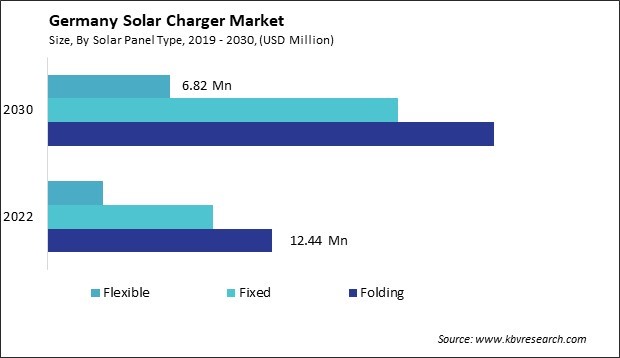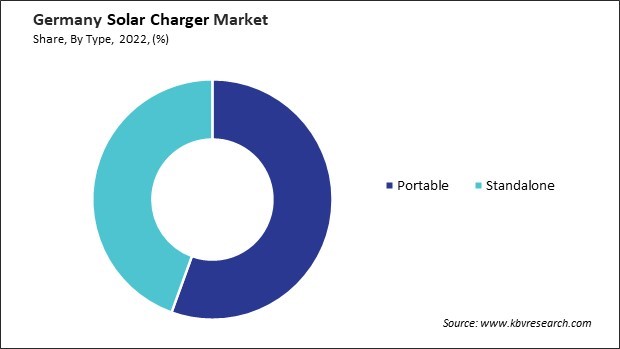Int'l : +1(646) 600-5072 | query@kbvresearch.com
Int'l : +1(646) 600-5072 | query@kbvresearch.com
Published Date : 29-Oct-2024 |
Pages: 41 |
Formats: PDF |
The Germany Solar Charger Market size is expected to reach $51.02 Million by 2030, rising at a market growth of 9.7% CAGR during the forecast period.
The solar charger market in Germany has experienced significant growth in recent years. Growing awareness of environmental issues and the desire to reduce dependence on traditional energy sources have led to a shift towards sustainable energy solutions like solar power. German consumers are increasingly mindful of their carbon footprint and are actively seeking eco-friendly alternatives, including solar chargers, to power their electronic devices while minimizing environmental impact.

As one of the leading countries in renewable energy adoption, Germany has seen a surge in demand for solar chargers across various sectors. One of Germany's key drivers of the solar charger market is the country's commitment to renewable energy and sustainability. According to the International Trade Administration, the country has set ambitious targets to source 80% of its energy from renewables by 2030. By 2022, Germany had made significant progress, achieving 46% of this goal. Renewable sources constituted a substantial 42.3% share of the domestic energy mix. With ambitious targets for reducing greenhouse gas emissions and increasing the share of renewables in the energy mix, there has been a growing emphasis on utilizing solar power for various applications, including charging electronic devices.
Furthermore, the COVID-19 pandemic has influenced the solar charger market in Germany. While the initial disruptions caused by supply chain disruptions and temporary closures of manufacturing facilities posed challenges to the industry, the pandemic highlighted the importance of resilient and sustainable energy solutions. The demand for portable solar chargers surged as Germans adapted to remote work and increased outdoor activities to maintain social distancing. With limited access to traditional power sources, consumers turned to solar chargers to keep their devices powered while enjoying outdoor activities or working remotely from locations without electricity access.
The e-commerce industry has played a pivotal role in expanding the solar charger market in Germany, offering consumers convenience, variety, and competitive pricing. E-commerce platforms provide a vast selection of solar chargers from various brands, specifications, and price points, allowing Germans to compare products and choose the one that best fits their needs and budget. This variety and choice is often unavailable in traditional brick-and-mortar stores, making e-commerce an attractive option for German consumers seeking specific features or designs in their solar chargers.
One key factor driving the growth of e-commerce in the solar charger market is its convenience. According to the International Trade Administration, in 2022, the e-commerce industry in Germany experienced robust growth, with total sales estimated at USD 141.2 billion, representing an impressive 11% increase compared to 2021. In 2022, the industry's online presence in Germany soared to a substantial 80%, securing its place as the third highest globally in terms of online industry penetration. With just a few clicks, German consumers browse a wide array of solar charger options from the comfort of their homes or on-the-go via mobile devices.
Additionally, e-commerce has facilitated the expansion of the solar charger market by reaching a broader audience beyond geographical boundaries. Consumers from remote areas or smaller towns where access to specialized stores be limited now easily purchase solar chargers online, increasing industry penetration. Hence, the convenience, variety, and competitive pricing provided by e-commerce platforms have been instrumental in driving the expansion of the solar charger market in Germany, catering to diverse consumer needs and facilitating broader industry access.
In Germany, the solar charger market is experiencing a significant uptick in demand, primarily driven by a growing awareness of renewable energy sources and a concerted effort to reduce carbon emissions. One of the key factors fueling this trend is the rising environmental consciousness among German consumers and businesses. As concerns over climate change continue to mount, there is a growing realization of the importance of adopting cleaner energy solutions. Solar chargers, powered by high-efficiency solar cells, represent a practical and eco-friendly way to harness the sun's abundant energy for everyday use.
Moreover, advancements in solar cell technology have led to significant improvements in efficiency and reliability, making solar chargers more viable for a wide range of applications. High-efficiency solar cells, such as monocrystalline and polycrystalline silicon cells, now convert a greater portion of sunlight into usable electricity, thereby enhancing the overall performance of solar chargers. As the cost of traditional energy sources continues to rise, solar power has become increasingly competitive in terms of cost and efficiency in Germany.
Furthermore, government incentives and subsidies promoting renewable energy adoption have stimulated demand for solar chargers in Germany. Various initiatives, such as feed-in tariffs and tax incentives, have made solar energy more accessible and attractive to consumers and businesses, thereby fostering a conducive environment for the growth of the solar charger market. Thus, the confluence of environmental consciousness, technological advancements, and supportive government policies has propelled the solar charger market in Germany.

Germany, renowned for its commitment to renewable energy and environmental sustainability, hosts a thriving solar charger market driven by technological innovation and consumer demand. One prominent player in the German solar charger market is Bosch Solar Energy AG. Leveraging its expertise in renewable energy technologies, Bosch Solar Energy specializes in the development and manufacturing of high-quality solar panels and related products, including solar chargers. The company's solar chargers are designed for residential and commercial use, featuring advanced photovoltaic cells and efficient charging capabilities. Bosch Solar Energy's products are known for their reliability, performance, and durability, making them a popular choice among consumers and businesses seeking sustainable energy solutions.
Another significant player in the German solar charger market is SolarWorld AG. With a focus on solar panel manufacturing, SolarWorld offers a range of solar chargers designed for portable electronics, outdoor activities, and off-grid applications. The company's solar chargers combine high-efficiency solar cells with lightweight, durable construction, providing users with convenient charging solutions for smartphones, tablets, and other devices. SolarWorld's products are widely available in Germany through various retail channels and online platforms, catering to a broad customer base.
EcoFlow is also making a name in the German solar charger market with its innovative portable power stations and solar generators. Founded to provide clean, reliable energy solutions for outdoor adventures, emergencies, and off-grid living, EcoFlow offers a range of solar chargers compatible with its power stations. These solar chargers feature foldable panels, built-in USB ports, and rugged construction, making them ideal for powering electronic devices on the go. EcoFlow's products are gaining popularity among outdoor enthusiasts, campers, and emergency preparedness enthusiasts in Germany.
Another notable player in the German solar charger market is Sono Motors. While primarily known for developing the Sion, a solar-powered electric car, Sono Motors also offers solar charging solutions for portable electronics. The company's solar chargers feature integrated solar panels and battery packs, allowing users to harness solar energy to charge their devices wherever they go. Sono Motors' solar chargers are designed to complement its electric vehicles, providing an eco-friendly charging option for smartphones, laptops, and other gadgets.
In addition to these key players, numerous other companies contribute to the vibrant and competitive landscape of the German solar charger market. These companies range from established solar panel manufacturers to startups and innovative startups specializing in solar charging technology. With Germany's continued commitment to renewable energy and sustainability, the solar charger market is expected to expand further in the coming years, offering consumers a growing array of options for harnessing solar power to charge their devices on the go.
By Solar Panel Type
By Type
By Application